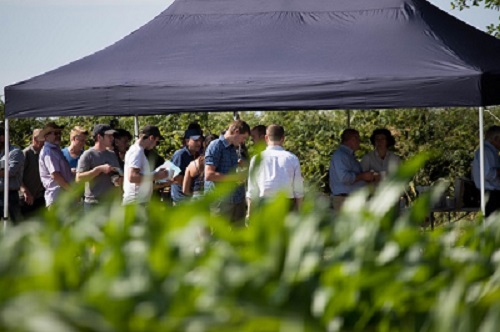Southern Catchment Manager
10 Sep 2018
Southern Catchment Manager
10 Sep 2018
Underlying Cheshire’s productive sandy-loam soil is porous sandstone. This forms part of one of the most important aquifers in the country and is an integral part of the North West’s drinking water supply. In recent years though we’ve been detecting rising levels of nitrates in some of the groundwater we abstract water from.

One cause is the growing of forage maize by dairy and beef farms in the area to use as feed. Forage maize is a crop where the potential for nitrate leaching loss to water is high due to the amount of nitrogen applied both from mineral fertilisers and applications of organic manures. In addition to nitrate loss, environmental and water quality issues associated with late harvesting of maize into the autumn, with bare soil left exposed over winter, can also cause pesticide pollution of surface water.
One way of tackling this issue is by under-sowing the maize with grass. Establishing a ‘nurse crop’ of grass during the maize establishment period is considered to be a valuable method of providing a post-harvest ‘mop’ to reduce nitrate loss through the soil profile. To test the viability of this solution, United Utilities’ Southern Catchment Area Team is carrying out a trial within a nitrate-sensitive water catchment zone near Delamere. The trial is being run at Higher Barn Farm in Tillington near Taporley from May 2018 to April 2019.
The principal contractor is Cheshire-based land and property specialist, Rostons Ltd, together with local agricultural consultant, Paul Sweeney Agronomy Ltd. These two businesses will grow the crop, establish the field trials and demonstration areas, collect samples and data and assist in demonstrating the site to visiting farmers and stakeholders.
The trial is being run on 30 plots over 90 acres and consists of 10 individual plot treatments featuring different methods for growing forage maize including:
The grass and maize forage will be assessed for crop yield, grass yield, quality, and nitrate capture. One field will include leachate-capture in the form of deep soil “porous pots” and soil run off will also be monitored.
This trial seeks to evidence the nitrate losses from maize growing combined with the potential economic benefits that growing the crop in an environmentally sustainable way can bring due to reduced fertiliser bills and improved soil health.
We held our first demonstration day in July 2018 to show local farmers how we’re trialling different methods and timings, using different types of farm machinery at different times, so they can see what would fit into their own individual farms.
Under-sowing maize benefits farmers by saving them money and improving their soils. It benefits us by helping us achieve our water quality and environmental objectives in Cheshire. Our next demonstration day is planned for 20 September 2018 with full results from the trial expected in Spring 2019.